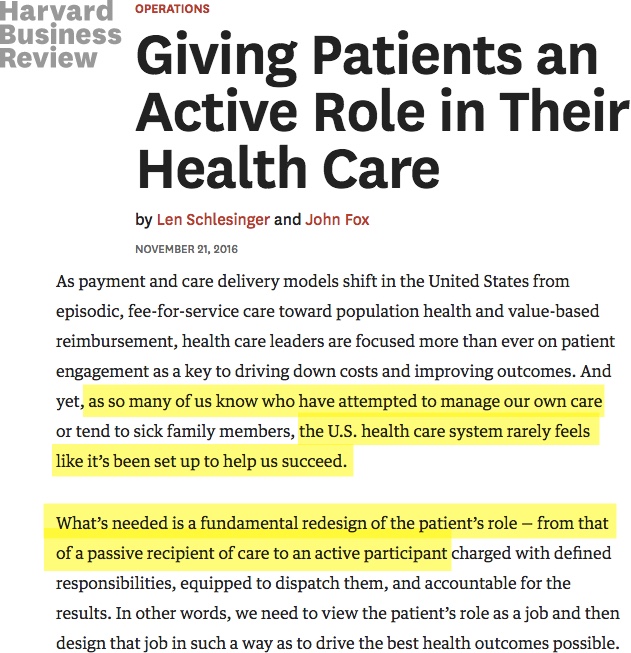 As kindlers and promoters of a social movement, our Society for Participatory Medicine keeps a keen eye out for signs of traction in credible places for what we’ve been advocating since 2009:
As kindlers and promoters of a social movement, our Society for Participatory Medicine keeps a keen eye out for signs of traction in credible places for what we’ve been advocating since 2009:
Participatory Medicine is a model of cooperative health care that seeks to achieve active involvement by patients, professionals, caregivers, and others across the continuum of care on all issues related to an individual’s health.
We’ve evangelized in this blog, our journal, numerous health policy meetings and hundreds of medical conferences. Our thinking has had lots of media coverage in healthcare-related publications, but this is a first: a new high-profile article in the Harvard Business Review, Giving Patients an Active Role in Their Health Care.
Here are a few quotes, including the highlights in this graphic:
- “What’s needed is a fundamental redesign of the patient’s role – from that of a passive recipient of care to an active participant”
- “We need to acknowledge and account for all the patient work that now goes unrecognized and unsupported. This means grappling with the complexity of tasks patients take on as they seek care across an ever-expanding number of settings”
- “Support the Patient through Network-Enabled Technology. Saying that the patient has a job to do does not in any way suggest that patients must shoulder the burden of their responsibilities unsupported. Technology is the key enabler of patients’ success, providing the information, visibility, and feedback they need to do their jobs.”
There’s much much more – please circulate, and discuss – how should we take action??






Thanks so much for letting me know about this post, Dave. Well done! I was impressed that patient-centric care ended up in THE Harvard Business Review.
Like we find among most (all?) academic/biz types, however, there’s that tech-as-saviour solution: “Technology is the key enabler of patients’ success” – which of course neatly ignores the irony of positioning that solution right beside the real burden of treatment/patient work involved in simply being a patient. This is particularly true for, as Dr. Victor Montori and his Mayo Clinic-based team continue to preach, those patients living with multiple chronic illness diagnoses.
For these people, adding one more tech solution doesn’t make like easier (as the worried well of the Quantified Self movement insist it will). It may in fact be adding to their burden.
I prefer an upstream reframe of this HBR article.
Activate People to Participate in Health Movements and Healthcare.
Value-based care is not designed to reduce gender and health inequities. We need health movements to reduce inequities.
I thank @epatientDave for signing this Family Doctor Campaign for Gender and Health Equity. I invite you to sign up too. https://www.thunderclap.it/projects/49497-gender-and-health-equity-cause